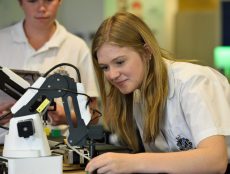
Articles
Editor’s Picks
Khan Academy Announces New Mastery Learning Features
By Henry Kronk
September 11, 2018
As learners across academic levels return to school this year, there’s a good chance they’ll spend some down time watching Khan Academy videos to refresh or further the education process. And when they do, they’ll notice some new features in certain subjects. As each video winds down, they’ll be asked a set of questions. If they don’t get a certain amount right, they won’t progress to the next video. Instead, they’ll rewatch until they have mastered the content. This is what the company is calling mastery learning.
“Some students are ready to move ahead, but other students need to go back and fill in those gaps,” said Khan Academy founder Sal Khan in a release. “The gaps aren’t the student’s fault, and they’re not the teacher’s fault either. It’s just a side effect of the fixed paced, nonmastery system that most students learn in.”
Khan Academy’s Brand of Competency-Based Learning

Others might know it as competency-based learning, or a form of personalized learning. The term ‘mastery learning’ was coined by Benjamin Bloom in 1968. In the years since, a large body of research has reported on its merits.
And as a proof of concept, Khan Academy did some research of its own. A Pennsylvania district piloted their mastery learning with over 1,000 students in middle school math. Following the conclusion of the ’17-’18 school year, they report that learners who’d used the new model for at least 30 minutes per week notched a 33% higher improvement on the NWEA MAP assessment compared to those who spent 15 minutes or fewer.
“We’re incredibly heartened by the improvements we’re seeing,” said Dr. David Baugh, superintendent of the Centennial School District in Warminster, Pa, in a statement. “Mastery learning on Khan Academy has been transformative in our district. We see it making a difference in kids’ lives, and it’s helping us close identified gaps. We hope and encourage other school districts across the country to embrace something that will make a difference in student learning.”
The Benefits of the New Model
The 30-minute-per-weekers also were found to be 2.5 times more likely to receive a score of proficient or advanced on the standardized test. This school, furthermore, has a diverse body of students, with roughly 40% qualifying for free or reduced lunch.
“The findings from Centennial School District are significant and reflect the positive findings in mastery-learning research over the years,” said Kelli Millwood Hill, director of efficacy and research at Khan Academy. “Student learning can be accelerated in a mastery framework.”
For now, mastery lessons are available in K-12 math and grammar, high school biology, and AP subjects such as Calculus (AB and BC), Statistics, Macroeconomics, Government and Politics, and Physics. More subjects will continue to roll out as the year progresses.
“Every teacher I know aspires to meet the individual needs of each student. However, traditional tools and curricula require teachers to make unrealistic, superhuman efforts to attain that ideal,” said Khan. “Khan Academy’s mastery learning system now allows every teacher to cater to the individual needs of every student in a way that is intuitive and frees up their time.”
While Khan Academy provides their signature short, digestible videos on topics ranging from ‘What Is an Algorithm?’ to ‘Personal Finance,’ the company has found that there’s an especially healthy appetite for their offerings among high school learners. Some of their most popular videos and units include prepping for standardized tests. The new offerings of mastery learning–with a heavy emphasis on AP subjects–further cements this trend.
Featured Image: Sal Khan at TechCrunch Disrupt 2012. TechCrunch, Flickr.









No Comments